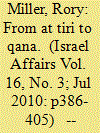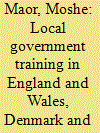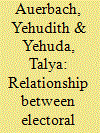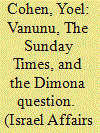|
|
|
Sort Order |
|
|
|
Items / Page
|
|
|
|
|
|
|
| Srl | Item |
| 1 |
ID:
096941


|
|
|
|
|
| Publication |
2010.
|
| Summary/Abstract |
In the period between 1978 and 2001 Ireland undertook the most significant operational tasking in its history on behalf of the United Nations, when it sent almost 40,000 troops to participate in the UNIFIL operation in Lebanon. This commitment increased Irish prestige across the international arena but it also had a highly negative impact on bilateral diplomatic and political relations between Ireland and Israel due to clashes and tensions between Irish UNIFIL peacekeepers and Israeli troops and their south Lebanese Christian allies. This article charts and examines the deterioration in Irish-Israeli relations and shows how events in Lebanon dominated the bilateral agenda in these two decades.
|
|
|
|
|
|
|
|
|
|
|
|
|
|
|
|
| 2 |
ID:
096944


|
|
|
|
|
| Publication |
2010.
|
| Summary/Abstract |
This article deals with the Israeli volunteering movement that preceded the outbreak of the 1956 war and centred on two public endeavours: the Defence Fund (Keren HaMagen) designed to help fund acquisition of weapons and the Fortification of the Frontier (Bitzur Hasfar), a framework that sent volunteers to work on fortifications and assist frontier settlements. These two endeavours were an expression of David Ben-Gurion's pioneering outlook that sought to blend voluntary components and the use of the central powers of the state, parallel to putting Israeli society on the necessary footing in the year that preceded the Sinai war.
|
|
|
|
|
|
|
|
|
|
|
|
|
|
|
|
| 3 |
ID:
096942


|
|
|
|
|
| Publication |
2010.
|
| Summary/Abstract |
The Israeli economy is the most developed in the Middle East. In order to maintain the high standards of living, the Israeli economy needs uninterrupted and secure energy supplies. The country, however, lacks adequate indigenous energy resources. This study examines energy cooperation between Israel and Iran prior to the 1979 Revolution and between Jerusalem and Cairo since the early 1980s. It also analyzes the growing energy partnership between Israel and the Caspian Sea region. It argues that cooperation in energy can enhance strategic cooperation.
|
|
|
|
|
|
|
|
|
|
|
|
|
|
|
|
| 4 |
ID:
096940


|
|
|
|
|
| Publication |
2010.
|
| Summary/Abstract |
This article highlights an interesting and often unduly neglected aspect of comparative public policy and administration: local government training. The argument advanced is that local government training based on the centrally focused model may tend to be: (i) skill-oriented and competence-framed; (ii) comprehensive; and (iii) quality-controlled in a relatively rigorous manner. By contrast, local government training based on the locally focused model may tend to be: (i) skill-oriented and competence-framed alongside a focus on 'people' and organizational issues, conventional policy issues and broad local government issues; (ii) non-comprehensive, and (iii) weakly controlled for quality. The integrative model, which is the most innovative form of the three models presented here, may tend to manifest a varied mix of the aforementioned features. Based on an institutional analysis combined with interviews with senior training officials at national and local levels, this argument is illustrated in England and Wales, Denmark and Israel in the hope that it could be a starting point for developing hypotheses and propositions.
|
|
|
|
|
|
|
|
|
|
|
|
|
|
|
|
| 5 |
ID:
096945


|
|
|
|
|
| Publication |
2010.
|
| Summary/Abstract |
The premise of the Arab-Israeli 'land for peace' process is that each side values what it will receive more than what it must surrender. The repeated failure of this process spanning decades reveals the shocking truth that this premise is erroneous. For the process to succeed, the currency that the Arabs must bring to the table is the ability and willingness to pay for their sovereignty in the currency of vigorous enforcement of Israeli rights and privileges, something they are not willing to do. Why not? At present, the payoff to the Palestinian Arabs as a body of a state is simply not worth the price they must pay.
|
|
|
|
|
|
|
|
|
|
|
|
|
|
|
|
| 6 |
ID:
096939


|
|
|
|
|
| Publication |
2010.
|
| Summary/Abstract |
This study explores the effects of changes in electoral systems on political marketing, and, more particularly, the impact of the shift from the parliamentary electoral system which has been in operation in Israel since 1948, to the presidentary (combined of elements from the parliamentary system, and the presidential system) on the two largest Israeli parties' marketing strategies. Out of 670 political broadcasts by Likud and Labour, 207 were examined for five out of the six electoral campaigns that took place since 1988: the 1988 and 1992 campaigns, before the switch to the presidentary system, the 1996 and 1999 campaigns after the establishment of the combined system and the 2003 campaign, after Israel changed back to the parliamentary electoral system. The findings supported the study's main arguments regarding the extent and direction of the impact of the change in the electoral system on the developments in political marketing. Beginning in 1996, there was a decrease in broadcasts presenting political issues and a sharp increase in broadcasts that focus on personality alone. Equivalently, the percentage of broadcasts addressing the centre of the political map, rather than distinct publics, grew significantly. In 2003, with the return to the parliamentary system, the marketing strategy of the two parties, and more particularly of the Labour Party, changed back to the pre-1992 pattern: a large percentage of the broadcasts focused on issues and not on the candidates' personalities, and addressed distinct target audiences rather than the centre.
|
|
|
|
|
|
|
|
|
|
|
|
|
|
|
|
| 7 |
ID:
096943


|
|
|
|
|
| Publication |
2010.
|
| Summary/Abstract |
On 5 October 1986 The Sunday Times published an expose about Israel's secret programme at its nuclear reactor in Dimona. Entitled 'Revealed: Israel's Nuclear Secrets', the expose drew upon data received from Mordechai Vanunu who worked at the reactor for seven years as a technician. The newspaper calculated that Israel possessed 100-200 nuclear warheads. The expose also claimed that Israel was developing a thermonuclear and neutron nuclear capability. The expose was a watershed in Israeli public and foreign governmental perceptions about the country's nuclear programme. While the expose resulted in a revision of international estimates about Israel's nuclear capability, some questioned The Sunday Times' estimates. The disclosure failed to bring about the collapse of the country's ambiguity policy. Reflecting the seriousness of the security leak, Vanunu was abducted back to Israel from Europe by the Mossad and sentenced to 18 years' imprisonment on charges of espionage and treason. This article examines how The Sunday Times investigated Vanunu's account, the impact of the expose abroad and inside Israel, and analyses the behaviour of the newspaper after Vanunu's abduction.
|
|
|
|
|
|
|
|
|
|
|
|
|
|
|
|
|
|
|
|
|